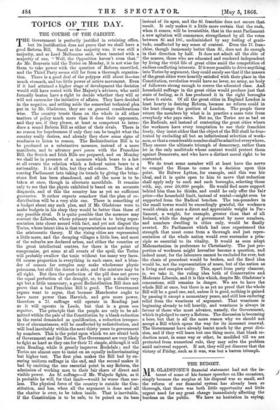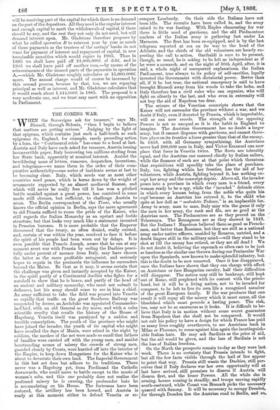THE BUDGET.
MR. GLADSTONE'S financial statement had not the in- terest of some of his former speeches on like occasions, simply because the surplus at his disposal was so small, and the reform of our financial system has already been so thorough, that there was both little opportunity and little urgent need for any great change immediately affecting the burdens on the public. We have no hesitation in saying,
however, that its real and lasting importance was much greater than that of any financial statement since the great reform of 1860. For in explaining and popularizing with so much vivacity and power the reasons for at once attempting a substantial reduction of the National Debt, Mr. Gladstone commenced what we trust will prove an important financial zevolution in the next century of our legislation.
But even the earlier part of his speech was not without its interest. Before touching on the greatest topic of his state- ment, it may be well to notice the valuable demonstration which he produced, that not only France, but the producing classes in France, the very people who had denounced free trade as entirely fatal to their industry, are profiting visibly and largely from the change which they regarded with so much terror ; nay, more, Mr. Gladstone showed that they were pro- sting more especially by the new impulse given to commercial exchanges with us, whom they regarded as their great rivals. Mr. Gladstone gave the following striking comparison between the value of the French exports in 1860, the year of the treaty, a year admitted to be a good year, and the same ex- ports in 1864. We turn the values into English money.
VALUE OF FRENCH EXPORTS IN
1860.
£ 1864.
£ Cottons 2,780,000 3,750,000 Linens 620,000 980,000 Woollens 9,170,000 14,240,000 Jams 500,000 1,720,000
£13,070,000 £20,690,000 —showing an increase in the export trade in the very branches Of trade which, as it was feared, would be so much injured,— of more than 50 per cent. in four years. And what is re- markable enough, the increase in the export to the rival manu- facturing State, England, is even greater than the general increase. The French exports to England, says Mr. Gladstone, " of woollens, linens, cottons, yarns, metal goods, earthenware, salt, glass, and fish, amounted in value to 2,340,0001. before the treaty in 1859, while in 1864 they had risen in value to 5,640,000/.,"—or had increased nearly 150 per cent. in five years. We may hope therefore that the producing classes in countries still burdened with protection will take heart, when they see how the dreaded rival of France is becoming at least as valuable a customer to her as she is a formidable rival, under the influence of a freer interchange of national advantages. Those who knew how free trade really works predicted this. They knew that in reality French taste and skill must have in many respects a great advantage over English energy and skill, and that the effect of freer interchange must be to give a considerable impulse to the demand for the higher sort of French manufactures, in consequence of giving England greater buying power, by reducing the embargo on those goods in the production of which English skill and industry have the advantage. Free trade no doubt does check the production of articles in which any country is at a general disadvantage as compared with other countries, but then, in compensation for doing so, it adds a much more than equivalent stimulus to the production of articles in which the same nation has a natural advantage. We may fairly hope therefore, as Mr. Gladstone pointed out, that in consequence of the simultaneous relaxation of foolishly protective tariffs in France, Austria, and so many other European countries, an enormous impulse will be given to our commerce during the next forty or fifty years, and the House of Commons obviously accepted with pleasure his proposal to do what little is still in our power to benefit Austria as well as ourselves, by remitting the 365,000/. worth of timber duties which we still collect, and making the trifling alteration in the wine duties for which she has asked.
But if these expectations of a sudden and great impulse to the English commerce of the next generation are well founded, as it seems to us, looking to the gradual extension of more liberal commercial views in Europe, impossible to doubt, unquestionably it becomes a duty of great importance, as Mr. Gladstone so powerfully pointed out, to let a generation with special resources provide for something more than their own absolute necessities, and transmit to the generations which come after them, when those special resources will be in pro- cess of exhaustion, as little burden, as little demand upon their energies'to meet the obligations incurred by their ancestors, as possible. Mr. Gladstone's picture of the growing indebtedness of Europe was a most striking and alarming one, but certainly it best becomes England, who has anticipated all other European
countries in the free development of her own great resources, and has already reaped much of the advantage which they have still to gain by similar wisdom in their legislation, to lead the way in the path of reducing that indebtedness, especially as Mr. Gladstone showed that the secret of our enormous start beyond the rest of Europe is a temporary advantage,—our wealth in coal,—which our posterity a hundred years hence will not inherit. A very ingenious letter, which we published last week, and on which we publish a criticism of some authority this, argued that reducing the National Debt was not neces- sarily the best, much less the only way, of doing what is in our power to relieve our posterity in the embarrassment to which the exhaustion of the coal may reduce them. Any- thing, said the writer, which increases the fixed capital, the per- manent productive power of the country, and so adds to its permanent wealth, is as beneficial to posterity as a diminution of its burdens. If a landowner works out his mines, but uses the profit in enlarging and draining his estate, he does more for his descendants than if he works out only a small part of his mineral wealth, and it does not matter whether he uses the money to pay off mortgages, or to increase the fertility and productiveness of his land. If the mortgages are at 3 per cent. and he can make 6 per cent. by draining, clearly he does more for his posterity in the latter way than the former. Hence he argued that if we work out our coal rapidly and invest the savings so gained, not in payment of debt, but in im- proving England in a way that will bring a higher rate of interest on our savings than we pay on our debt, we may do more for posterity than by paying it off. That is true. But the danger of this line of argument is that the immediate pro- fits produced by our wealth in coal go into private persons' pockets, and over the mode in which they are expended or invested, if they be invested, the public and the Government have no control., An immense proportion of them must in all probability be spent on stimulating population,— on producing food and clothing for the working class,— and a great increase in population will not be a new advan- tage, but a new difficulty to England, whenever our natural resources are in process of exhaustion. All the additions, too, made by the new wealth to the mere luxury of England will not be investments for posterity, but consumption. In short, probably the only way in which Government can secure that the wealth of this generation shall go to increase the wealth or, what is the same thing, diminish the burdens of the next, is by increasing the general productiveness of the land, which is only to a very small extent now possible. Even the stimulus given to manufacturing ingenuity, if it be a kind of manufac- turing ingenuity which chiefly depends on coal for its exercise, will not avert, but hasten the crisis. We think the best argument in deprecation of the moral duty which Mr. Gladstone imposes on us, is that paying off a national debt is amere transfer of resources as between different elements of the nation, from A's pocket into B's, which cannot per se possibly make the nation richer or poorer ;—except thus far, that it liberates the labour which is at present wasted in collecting the revenue, and, by the remission of taxes, leaves us free, in case of any future neces- sity for raising a loan, to adopt taxes which are not very injurious to industry, instead of taxes which are. A, the ordinary taxpayer, pays more now to B, the fundholder, in order that A's successors may pay less in future to B's suc- cessors. And it may be argued that therefore A will have less to bequeath to his own successors in proportion to the increase of his payments to B now. And that is, we take it, true ; but still the certaintyremains that the collection of revenue is always a waste of labour, and that the fewer taxes we have, the more we can in time of necessity put on without materially trip- ling the powers of industry. So far as this goes,—and it really does go some way, though not so far as is ordinarily thought, —the payment of debt is a real diminution of burden on the future.
Mr. Gladstone's proposal is in itself most wise and moderate. He proposes to apply about 1,005,000/. annually, for the next eighteen years, to the conversion of debt into terminable an- nuities, but out of this 1,005,0001. we shall not feel the fresh burden of quite half, since 600,0001. and something more of long annuities fall in next year. What he proposes practi- cally is this. The nation owes 24,000,0001., with the interest thereon, 720,0001., to the trustees of the savings' banks. He proposes to repay the whole 24,000,0001. by instalments, as well as the yearly interest, in the next eighteen years. To do this we must pay 1,725,0001. each year. That is what Mr. Gladstone called operation A. But then the trustees of the sav- ings' banks' funds will be getting more than they want. They
will be receiving part of the capital for which there is no demand on the part of the depositors. All they need is the regular interest and enough capital to meet the withdrawals of capital, if there should be any, and the rest they not only do not need, but will demand interest upon. Mr. Gladstone therefore proposes by what he called operation B to reinvest year by year as much of these payments as the trustees of the savings' banks do not want for payment of interest and repayment of capital, in new terminable annuities which would expire in 1905. Thus in 1885 we shall have paid off 24,000,000/. of debt, and in 1905 we shall have paid off another sum,—by means of the reinvestments of the unused parts of the payments in operation A,—which Mr. Gladstone roughly calculates at 15,000,0001. more. The annual charge would of course be increased by this second process, because by that, too, we are repaying principal as well as interest, and Mr. Gladstone calculates that it would reach about 1,444,000/. in 1885. The proposal is a very moderate one, and we trust may meet with no opposition in Parliament.
































 Previous page
Previous page